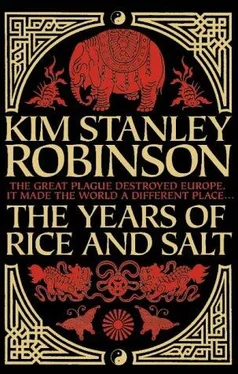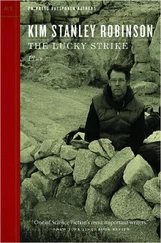Kim Robinson - The Years of Rice and Salt
Здесь есть возможность читать онлайн «Kim Robinson - The Years of Rice and Salt» весь текст электронной книги совершенно бесплатно (целиком полную версию без сокращений). В некоторых случаях можно слушать аудио, скачать через торрент в формате fb2 и присутствует краткое содержание. Год выпуска: 2003, ISBN: 2003, Издательство: Bantam Books, Жанр: Альтернативная история, на английском языке. Описание произведения, (предисловие) а так же отзывы посетителей доступны на портале библиотеки ЛибКат.
- Название:The Years of Rice and Salt
- Автор:
- Издательство:Bantam Books
- Жанр:
- Год:2003
- ISBN:0-553-10920-0
- Рейтинг книги:5 / 5. Голосов: 1
-
Избранное:Добавить в избранное
- Отзывы:
-
Ваша оценка:
- 100
- 1
- 2
- 3
- 4
- 5
The Years of Rice and Salt: краткое содержание, описание и аннотация
Предлагаем к чтению аннотацию, описание, краткое содержание или предисловие (зависит от того, что написал сам автор книги «The Years of Rice and Salt»). Если вы не нашли необходимую информацию о книге — напишите в комментариях, мы постараемся отыскать её.
The Years of Rice and Salt — читать онлайн бесплатно полную книгу (весь текст) целиком
Ниже представлен текст книги, разбитый по страницам. Система сохранения места последней прочитанной страницы, позволяет с удобством читать онлайн бесплатно книгу «The Years of Rice and Salt», без необходимости каждый раз заново искать на чём Вы остановились. Поставьте закладку, и сможете в любой момент перейти на страницу, на которой закончили чтение.
Интервал:
Закладка:
They approached Temur’s great encampment, and the black stormcloud covered the rest of the day, causing a darkness like night. Hair rose on the back of Bold’s neck. A few big raindrops splashed down, and thunder rolled out of the west like giant iron cartwheels overhead. They hunkered down in their saddles and kicked the horses on, reluctant to return in such a storm, with such news. Temur would take it as a portent, just as they did. Temur often said that he owed all his success to an asura that visited him and gave him guidance. Bold had witnessed one of these visitations, had seen Temur engage in conversation with an invisible being, and afterward tell people what they were thinking and what would happen to them. A cloud this black could only be a sign. Evil in the west. Something bad had happened back there, something worse even than plague, maybe, and Temur’s plan to conquer the Magyars and the Franks would have to be abandoned; he had been beaten to it by the goddess of skulls herself. It was hard to imagine him accepting any such preemption, but there they were, under a storm like none of them had ever seen, and all the Magyars were dead.
Smoke rose from the vast camp’s cooking fires, looking like a great sacrifice, the smell familiar and yet distant, as if from a home they had already left forever. Psin looked at the men around him. “Camp here,” he ordered. He thought things over. “Bold.”
Bold felt the fear shoot through him.
“Come on.”
Bold swallowed and nodded. He was not courageous, but he had the stoic manner of the qa’uchin, Temur’s oldest warriors. Psin also would know that Bold was aware they had entered a different realm, that everything that happened from this point onward was freakish, something preordained and being lived through inexorably, a karma they could not escape.
Psin also was no doubt remembering a certain incident from their youth, when the two of them had been captured by a tribe of taiga hunters north of the Kama River. Together they had staged a very successful escape, knifing the hunters’ headman and running through a bonfire into the night.
The two men rode by the outer sentries and through the camp to the khan’s tent. To the west and north lightning bolts crazed the black air. Neither man had seen such a storm in all their lives. The few little hairs on Bold’s forearms stood up like pig bristles, and he felt the air crackling with hungry ghosts, pretas crowding in to witness Temur emerge from his tent. He had killed so many.
The two men dismounted and stood there. Guards came out of the tent, drawing aside the flaps of the doorway and standing at attention, ready with drawn bows. Bold’s throat was too dry to swallow, and it seemed to him a blue light glowed from within the great yurt of the khan.
Temur appeared high in the air, seated on a litter his carriers had already hefted on their shoulders. He was pale-faced and sweating, the whites of his eyes visible all the way around. He stared down at Psin.
“Why are you back?”
“Khan, a plague has struck the Magyars. They’re all dead.”
Temur regarded his unloved general. “Why are you back?”
“To tell you, Khan.”
Psin’s voice was steady, and he met Temur’s fierce gaze without fear. But Temur was not pleased. Bold swallowed; nothing here was the same as that time he and Psin had escaped the hunters, there wasn’t a single feature of that effort that could be repeated. Only the idea that they could do it remained.
Something inside Temur snapped, Bold saw it—his asura was speaking through him now, and it looked like it was wreaking great harm in him as it did. Not an asura, perhaps, but his nafs, the spirit animal that lived inside him. He rasped, “They cannot get away as easily as that! They will suffer for this, no matter how they try to escape.” He waved an arm weakly. “Go back to your detachment.”
Then to his guards he said in a calmer voice, “Take these two back and kill them and their men, and their horses. Make a bonfire and burn everything. Then move our camp two days’ ride east.”
He raised up his hand.
The world burst asunder.
A bolt of lightning had exploded among them. Bold sat deaf on the ground. Looking around stunned, he saw that all the others there had been flattened as well, that the khan’s tent was burning, Temur’s litter tipped over, his carriers scrambling, the khan himself on one knee, clutching his chest. Some of his men rushed to him. Again lightning blasted down among them.
Blindly Bold picked himself up and fled. He looked over his shoulder through pulsing green afterimages, and saw Temur’s black nafs fly out of his mouth into the night. Temur-i-Lang, Iron the Lame, abandoned by asura and nafs both. The emptied body collapsed to the ground, and rain bucketed onto it. Bold ran into the dark to the west. We do not know which way Psin went, or what happened to him; but as for Bold, you can find out in the next chapter.
2
Bold ran or walked west all that night, scrambling through the growing forest in the pouring rain, climbing into the steepest hills he could find, to evade any horsemen who might follow. No one would be too zealous in pursuit of a potential plague carrier, but he could be shot down from a good distance away, and he wanted to disappear from their world as if he had never existed. If it had not been for the uncanny storm he would certainly be dead, already embarked on another existence: now he was anyway. Gone, gone, gone beyond, gone altogether beyond…
He walked the next day and all the second night. Dawn of the second day found him hurrying back through the Moravian Gate, feeling that no one would dare follow him there. Once onto the Magyar plain he headed south, into trees. In the morning’s wet light he found a fallen tree and slipped deep under its exposed roots, to sleep for the rest of the day in hidden dryness.
That night the rain stopped, and on the third morning he emerged ravenous. In short order he found, pulled, and ate meadow onions, then hunted for more substantial food. It was possible that dried meat still hung in the empty villages’ storehouses, or grain in their granaries. He might also be able to find a bow and some arrows. He didn’t want to go near the dead settlements, but it seemed the best way to find food, and that took precedence over everything else.
That night he slept poorly, his stomach full and gassy with onions. At dawn he made his way south, following the big river. All the villages and settlements were empty. Any people he saw were dead on the ground. It was disturbing, but there was nothing to be done. He too was in some kind of posthumous existence, a very hungry ghost indeed. Living on from one found bite to the next, with no name or fellows, he began to close in on himself, as during the hardest campaigns on the steppes, becoming more and more an animal, his mind shrinking in like the horns of a touched snail. For many watches at a time he thought little but the Heart Sutra. Form is emptiness, emptiness form. Not for nothing had he been named Sun Wu-kong, Awake to Emptiness, in an earlier incarnation. Monkey in the void.
He came to a village that looked untouched, skirted its edge. In an empty stable he found an unstrung bow and a quiver of arrows, all very primitive and poorly made. Something moved in the pasturage outside, and he went out and whistled up a small black mare. He caught her with onions, and quickly taught her to take him on her back.
He rode her across a stone bridge over the big river, and slowly crossed the grain of the land southward, up and down, up and down. All the villages continued empty, their food rotted or scavenged by animals, but now he had the mare’s milk and blood to sustain him, so the matter was not so urgent.
Читать дальшеИнтервал:
Закладка:
Похожие книги на «The Years of Rice and Salt»
Представляем Вашему вниманию похожие книги на «The Years of Rice and Salt» списком для выбора. Мы отобрали схожую по названию и смыслу литературу в надежде предоставить читателям больше вариантов отыскать новые, интересные, ещё непрочитанные произведения.
Обсуждение, отзывы о книге «The Years of Rice and Salt» и просто собственные мнения читателей. Оставьте ваши комментарии, напишите, что Вы думаете о произведении, его смысле или главных героях. Укажите что конкретно понравилось, а что нет, и почему Вы так считаете.












